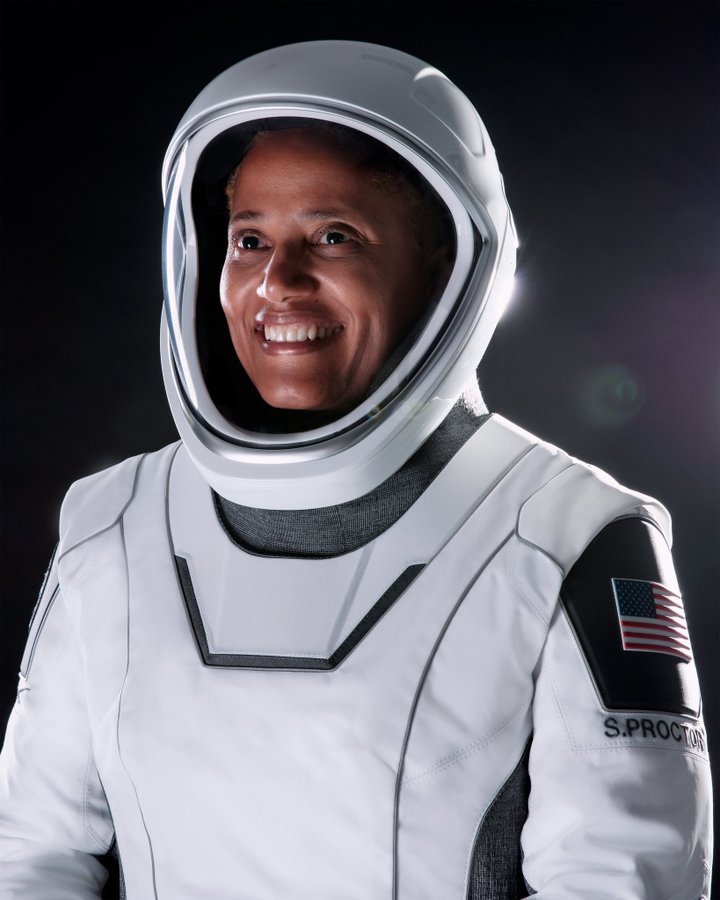Sian Proctor makes history with SpaceX's Inspiration4 as first-ever Black female spacecraft pilot
"I have this opportunity to not only accomplish my dream, but also inspire the next generation of women of color and girls of color," Sian Proctor said.
Sian Proctor is making history as the first-ever Black female spacecraft pilot.
Proctor, a geoscientist, artist and science communicator, has been paving the way in the space sector for decades. Now, years after being a finalist in NASA's astronaut candidate program back in 2009, she is realizing her dream of becoming an astronaut as she launches to orbit with the Inspiration4 mission tonight (Sept. 15).
While the mission itself is making history as the first all-civilian mission to launch to orbit, Proctor is accomplishing a major first herself as the first Black female spacecraft pilot.
"I'm really grateful to be here and to have this opportunity," Proctor said Sept. 14 during a news conference with reporters. "There have been three Black female astronauts that have made it to space, and knowing that I'm going to be the fourth means that I have this opportunity to not only accomplish my dream, but also inspire the next generation of women of color and girls of color and really get them to think about reaching for the stars and what that means."
Live updates: SpaceX's Inspiration4 private all-civilian orbital mission
More: Inspiration4: When to watch and what to know

Proctor is preceded by only six other Black female astronauts in history, only three of which have flown to space.
The first-ever Black woman to fly to space was Mae Jemison, who flew on the space shuttle Endeavour with the STS-47 mission in 1992. Following her, Stephanie Wilson and Joan Higginbotham also flew with NASA shuttle missions.
Get the Space.com Newsletter
Breaking space news, the latest updates on rocket launches, skywatching events and more!
There are three other Black women who are NASA astronauts but have never flown to space; they include Yvonne Cagle, Jessica Watkins and Jeanette Epps, who was selected by NASA in 2009 in the same astronaut-selection round as Proctor. Cagle works in NASA management currently, while Watkins was recently selected as part of NASA's 22nd astronaut class.
Epps is slated to fly to space with Boeing's Starliner astronaut taxi, once the company completes its first test flights of the new vehicle. In 2020, Epps was chosen to fly with Boeing's Starliner-1 mission, the first operational mission for the craft that will take a crew of four to the International Space Station. The launch date for that mission is planned for sometime in 2022.
In addition to sharing her excitement about being a part of this mission and about becoming an astronaut, Proctor also shared how, as a Black woman, she has had to deal with added pressures in her journey to space.
"Growing up as a Black female and always trying to be a high achiever and not mess up," Proctor added, "just having that pressure on yourself of thinking about not wanting to be eliminated, not wanting to miss out, [you have to] make sure you're the best of the best, because you're opening up the door for the people who follow you."
"A lot of times, you know, if you're in a position of a role model, if you slip or you mess up, then it means that you're kind of shutting the door for those behind you," she added.
Proctor also referenced her hope for space to one day align with her "JEDI" acronym, which stands for just, equitable, diverse and inclusive, she said during the news conference.
In addition to being the first Black female spacecraft pilot, Proctor will also be the oldest Black woman to go to space, flying at 51 years old. She spoke to this aspect, and how so many think that by being over a certain age they can no longer do incredible things.
"Being an older Black female in my 50s, I think that I think it's just going to be inspiring to see that those dreams that you had when you were a kid can still come to, because a lot of times we think that we've missed our prime in our 20s and our 30s go by, and then we get into our 40s. And we're like, 'oh, yeah, all right.' But it's not true."
"I think that when we lift off, it's going to be inspiring not only for me, but I think everybody who's following along because they can connect with every one of our crewmembers in a unique and special way," she added.
Proctor will launch to space as part of Inspiration4 alongside crewmates, commander Jared Isaacman, medical officer Hayley Arceneaux and mission specialist Chris Sembroski.
Email Chelsea Gohd at cgohd@space.com or follow her on Twitter @chelsea_gohd. Follow us on Twitter @Spacedotcom and on Facebook.
Join our Space Forums to keep talking space on the latest missions, night sky and more! And if you have a news tip, correction or comment, let us know at: community@space.com.

Chelsea “Foxanne” Gohd joined Space.com in 2018 and is now a Senior Writer, writing about everything from climate change to planetary science and human spaceflight in both articles and on-camera in videos. With a degree in Public Health and biological sciences, Chelsea has written and worked for institutions including the American Museum of Natural History, Scientific American, Discover Magazine Blog, Astronomy Magazine and Live Science. When not writing, editing or filming something space-y, Chelsea "Foxanne" Gohd is writing music and performing as Foxanne, even launching a song to space in 2021 with Inspiration4. You can follow her on Twitter @chelsea_gohd and @foxannemusic.









